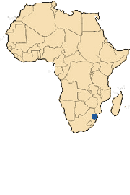
Eswatini is located in Southern Africa, bordering South Africa and Mozambique, east of the Drakensberg Mountains and south of Kruger National Park. The second smallest country in Africa, Eswatini is roughly the size of Rheinland-Pfalz with just over one million inhabitants. Only 30% of the population lives in the cities: The climate is subtropical and the time zone CET +1 hour.
Official Name: Umbuso weSwatini
Country name: Kingdom of Eswatini (Kingdom of Eswatini)
Type of state: Absolute monarchy
Head of state: King Mswati III. (since 25.04.1986)
Capital: Mbabane
Largest city: Manzini – 100,000 inhabitants
Airport: King Mswati III International Airport Sikhupe
Official language: SiSwati – Swazi -, English
Population: about 1.3 million
Currency: Emalangeni, South African Rand
Religions: 70 percent Christian-oriented African religions; 25 percent Protestants and Catholics, also: Muslims, Bah’ha’i and Methodists
Life expectancy: 59.40 years (World Bank 2018)
Until 2014, Eswatini was one of the countries with the highest HIV/AIDS rate “Acquired Immunodeficiency Syndrome" – “Acquired Immunodeficiency Syndrome" of 42.9% worldwide. A positive trend has been observed since the last 3 years. According to a 2018 study, the rate is 27.2%. Due to intensive education of the population, especially the sexually active children and adolescents and regular distribution of free antiretroviral drugs, in short: ART by the government, the latest statistics of the Ministry of Health – Ministry of Health and the National HIV/AIDS Case Survey Unit show the rate of 26.1% (as of Feb. 2016). However, what is still visibly evident, HIV/AIDS is milling the middle, working generation out of society. Left behind are the elderly and children with high socialization vulnerability.
While Mswati III lives lavishly as the absolute monarch in the Kingdom of Eswatini, much of the population still lives in absolute poverty. In the widely separated villages/homesteads in southern Eswatini, there is neither sufficient food nor clean drinking water.
Many children could not go to school in the past because they could not afford the costs for school fees, school uniforms, school materials and transportation. However, a positive development can be seen in the education system. The school fees for elementary school from grades 1 to 7, which were incurred up to now, no longer have to be paid to the schools by the parents. This means that so-called AIDS orphans will also be able to attend school. School fees must still be paid for secondary schools. However, for AIDS orphans registered with the government, the country will cover the cost of school attendance.
An entire generation is missing its parents. According to current figures, more than 120,000 children, or about ten percent of the population, are orphans who have lost one or both parents to AIDS. The consequences for the children are devastating. Traditionally, children are taken in and cared for by the extended family. However, the situation continues to show that girls in particular are at risk. Many see no other way out than prostitution.
The problem of child poverty and child labor exists throughout the country for various social, cultural and political reasons, as the working generation dies off due to the pandemic of HIV/AIDS. Old people and children are left behind. As a result, grandmothers care for up to 8-12 children of their own deceased children. We also encounter many so-called “children’s households" in which the oldest child, mostly girls, has to take care of the younger siblings. They get most of their food from the World Food Program (WFP). Often the same food is cooked every day: Beans with maize porridge.
MEDEA and our local partner organization CARITAS Eswatini, based in Manzini, work closely together. This way, the project " Helping people to help themselves" can be guaranteed in the long term.









